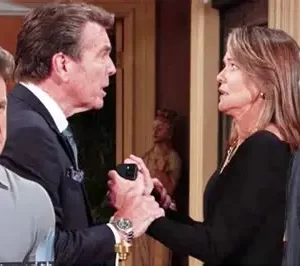Under the blazing Mediterranean sun, the elegance of Nice, France, with its terracotta rooftops, shimmering sea, and winding cobblestone streets, seemed untouched by darkness. But beneath the surface, a storm of betrayal, death, and secrets threatened to rupture every illusion of peace. What was meant to be a quiet romantic getaway for a few Genoa City elites had turned into a twisted crime scene soaked in blood and paranoia.
Damian Cain, a vibrant new presence in their social orbit, had just begun to shake up dynamics and forge connections. His charm sliced through tension like a blade. But now, that same charm lay extinguished in a dark alley behind an unassuming villa, his body discarded like yesterday’s wine, his eyes frozen in the horror of betrayal. Nate Hastings stood in silent disbelief, the waves crashing below the cliffside doing nothing to drown out the pounding in his ears. The last thing he expected when agreeing to this trip was to become embroiled in a murder that struck so close to home.
Amy Lewis, who had been growing increasingly close to Damian, hovered near the balcony, pale and trembling, unable to process the magnitude of what had occurred. Their group had arrived in Nice to explore possibilities, heal old wounds, and perhaps spark new beginnings, but instead, they were now central players in an unfolding nightmare. The question wasn’t just who killed Damian; it was why, and what monster among them had wielded the knife with such brutal, deliberate cruelty?
The story that would emerge, fragmented and filtered through whispers, denial, and misdirection, revealed that Damian and Cain Ashby had been lured into a false sense of camaraderie. Under the guise of reconciliation and celebration, they had been served drinks laced with a potent sedative, the kind favored by men who liked to remain unseen, undetected, untraceable. A figure masked in black, gloved and silent, had stalked them under cover of darkness. Cain had gone into a semi-conscious daze, barely able to register what was happening, while Damian, despite his drugged haze, tried to resist. He failed.
The knife struck him low and fast, not once, but twice, with expert precision, severing both his ability to flee and his chance of survival. By the time Cain staggered back to awareness, blood pooled around Damian like a final curse. The killer was gone, as was the illusion of safety. Now, Audra Charles, who had arrived in Nice with hopes of a well-deserved break from the drama of Genoa City, found herself at the epicenter of this spiraling hell.
Her relationship with Nate had started as a calculated spark, a collision of ambition and desire. But something had shifted. She had grown to care genuinely, deeply. And when she saw the look on Nate’s face as the news came in—shock melting into anger, fear, and something unspoken—she knew she would be the one to carry the weight of this tragedy. She would have to be the voice that delivered the unbearable truth. But how do you deliver news like that when nothing around you is stable? How do you confront others with a tragedy when your own foundations are shaking?
Because Cain Ashby, a man already teetering on the edge of control, had now become something else entirely. In the aftermath of the murder, Cain’s grip on reason slipped. Whether driven by guilt, fear of being blamed, or the unraveling of something deeper, he locked down the villa. Guests who had once freely mingled on the marble terraces and strolled along the lavender-filled gardens were now confined to their rooms, watched over by private security disguised as staff. Doors were bolted, phones confiscated, and any attempt at leaving was met with vague threats and eerie calm. It wasn’t a vacation anymore; it was a siege, and Cain was the self-appointed warden.
Audra’s instincts screamed at her to run, but she couldn’t leave Nate, nor could she abandon Amy, who had gone into near catatonia. The two women shared quiet glances across the tense dinner table, their eyes flicking toward the shadows in the hallway and Cain’s silent patrols. Nate, for his part, had begun to gather fragments of a plan. As a doctor, he knew how to mask his emotions, how to keep calm under pressure, but this was beyond any surgery room or medical crisis. This was a puzzle of human frailty and raw danger, and if he didn’t solve it quickly, more lives could be lost.
Then there was Chance Chancellor. When the call came through, interrupting his meeting back in the U.S., he knew he couldn’t sit this one out. Though the murder had taken place beyond his jurisdiction, the name Damian Cain triggered something in him—not just because of the loss, but because the method felt personal, deliberate, planned. Chance boarded the first available flight to Nice, armed with little more than his badge, intuition, and a warning from his superiors not to get involved. But how could he not? The Chancellor blood in him refused to ignore injustice, and he had a sinking feeling this crime was just the beginning.
When Chance arrived, the villa was still under Cain’s lockdown, though by then it had begun to fray. The other guests were restless, suspicious, and frightened. They spoke in hushed tones about what they had seen or thought they had seen. One woman recalled a strange figure in the olive grove the night of the murder. Another had heard voices raised in an argument between Damian and someone over the phone earlier that afternoon. All of it was noise and conjecture until Chance found the first real lead: a security tape from a nearby café showing Damian meeting someone in a dark suit just hours before his death. The footage was grainy, the audio corrupted, but Chance recognized the silhouette. He just couldn’t place it—not yet.
Meanwhile, Audra reached her breaking point. Trapped in Cain’s estate, forced to watch Amy spiral and Nate simmer with impotent fury, she knew she had to act. Slipping out one morning under the pretense of walking in the gardens, she used a burner phone hidden in her luggage to call Chance. Her voice shook as she recounted everything: Damian’s growing paranoia before the murder, Cain’s increasing volatility, the isolation, the strange surveillance. Chance didn’t hesitate. That call became the catalyst for dismantling the walls Cain had built.
But just as reinforcements arrived and guests were finally freed, Cain disappeared. He left behind a cryptic letter and a trail of financial transactions that suggested he’d been covering something up—perhaps debts, perhaps something darker. His sudden vanishing act opened an entirely new chapter in the investigation. Had Cain witnessed the killer’s face? Had he been involved, or had he simply cracked under the pressure of watching a man die beside him?
Nate, now more determined than ever, began digging into Damian’s past. What he found startled him. Damian had been in contact with someone in Genoa City just days before his death—someone tied to a scandal buried years ago involving a pharmaceutical company, missing research files, and a bribery scheme that could destroy reputations if revealed. Damian had been on the verge of exposing it. His death wasn’t random; it was a message. Suddenly, everything made sense. The methodical nature of the murder, the sedation, the knife, the isolation—it wasn’t a crime of passion. It was a hit—cold, clean, professional. The killer had used the chaos of Nice to their advantage, knowing that the city’s beauty would mask their exit. They’d calculated Cain’s instability, Damian’s recklessness, and the guests’ silence.
What they hadn’t counted on was Audra, Chance, or Nate’s relentless refusal to be cowed. Now, as the ripples of Damian’s death extend back to Genoa City, alliances will crack, secrets will surface, and enemies long hidden in boardrooms and bedrooms will step into the light. Audra, no longer content to be the messenger, prepares to play a deeper role. Nate, hardened by grief, eyes justice not through law, but through strategy. And Amy, fragile yet wounded, but burning beneath the surface, will become the key. Because in Nice, death wasn’t the end; it was the ignition point, and someone is going to burn.
Somewhere beyond the high hedges of the overgrown villa in Nice, where beauty had long surrendered to chaos, time began to tick again. The guests, once held captive in Cain Ashby’s labyrinthine estate, would soon reenter the world. Whether by finally accessing mobile networks or slipping through an unguarded path carved in panic, they would escape this waking nightmare. But no one would walk away untouched—especially not Nate Hastings, especially not Amy Lewis. The death of Damian Cain, swift, violent, and precise, had struck not just a man, but a fragile new bond between siblings who had barely begun to rebuild a shattered lineage.
For Nate, the emotional wreckage was like a rising tide, each memory, each lost opportunity, each unanswered question piling higher until the weight of grief threatened to consume him entirely. He had spent a lifetime with clinical detachment, trained to fix bodies, repair trauma, and shield emotions behind his medical oath. But nothing could have prepared him for this. Not the body lying in the morgue, not the eyes of Amy, his newly discovered sister, now haunted by an agony that reached far beyond mourning. Because for Amy, this loss wasn’t just sudden; it was cruel. It was the obliteration of a second chance. She had just begun to reconcile with her son, to feel that the doors of the past had creaked open wide enough to let love in. Damian, for all his sharp edges, had given her that rarest of gifts: forgiveness. And now he was gone, murdered, erased. His final words already vanishing into the salty wind of the French Riviera.
Amy, already weakened by her own battle with leukemia, now faced a far more sinister threat: the emotional collapse that could sabotage her recovery entirely. Nate saw it happening in slow motion—her pulse irregular, her voice fading, her eyes fixed on things only she could see. The weight of maternal guilt, the self-flagellation of believing she could have done something, anything, to prevent his death, was metastasizing faster than any cell disorder he had studied. Fans of The Young and the Restless would recall the eerie foreshadowing—a moment Amy hugged Damian goodbye before the party, her arms lingering, her expression unreadable. Some had chalked it up to sentimentality, others to anxiety. But now it seemed something primal had stirred in her—a mother’s intuition on the edge of doom. She had known. On some level, she had known. And that unspoken knowing would torment her more than any doctor’s prognosis.
With Damian’s body awaiting repatriation, Nate knew he couldn’t allow this tragedy to spiral into deeper silence. Answers had to be found. Justice, real and public, had to be pursued. And Cain, no matter how unhinged or traumatized he appeared, had to be held accountable because nothing about that night sat right. The drinks, the isolation, the missing time—it wasn’t coincidence. It was orchestration. And Nate, no longer just a healer but now a protector, began to chase the truth—not as a passive participant, but as an avenger for the dead and the dying.
Meanwhile, Amy’s grief took a more internal path. She began to recount every moment with Damian—the phone calls, the short messages, the looks he gave her when he believed no one else was watching. A flicker of hope extinguished, now only visible through cracked memories. She spoke aloud to no one, sometimes reciting phrases he’d once said. Her dreams were no longer hers; they belonged to the echo of her son. And yet, beneath that fog, a realization began to sharpen. She had known something was wrong that night. She had told him to stay behind, had begged him to let the evening pass without conflict. He hadn’t listened. And now she couldn’t forgive herself. The guilt crystallized into obsession.
In a horrifying twist of irony, the intuition that had once tried to save Damian now became the very blade slicing through her healing. Nate noticed the change—how Amy would stare out at the coastline as if expecting him to walk back from the sea. He knew he had to act before grief claimed her completely. The mission became clear: expose Cain’s negligence or complicity, confront the shadows that hovered around Damian’s past, and somehow restore Amy’s will to fight—for herself, for Damian’s memory, for a future that wasn’t drowned in regret.
As whispers from Genoa City filtered through their circles, speculation began to swirl. Had Damian stumbled upon something dangerous? Had his efforts to rebuild his life exposed secrets meant to stay buried? Some hinted at a cover-up involving financial laundering, others at a pharmaceutical conspiracy with ties back to Amy’s old colleagues. One name kept surfacing in the background: Cain. His disappearance was too convenient, his lockdown too suspicious, and Nate knew that Cain’s guilt, whether by action or omission, was something he could no longer ignore.
Nate and Amy would return to Genoa City soon, but not to mourn in silence. They would return armed with pain, demanding answers, and if no one offered them, they would drag the truth into the light themselves. And for Cain Ashby, wherever he had gone, the countdown to reckoning had already begun. Because in this story, grief would not be passive. It would roar like a storm, devour secrets, and grind guilt into dust.






